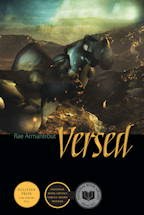Versed by Rae Armantrout – a Book Review
Versed by Rae Armantrout – a Book Review
By Mahbubul Karim (Sohel)
November 30, 2010
November 30, 2010
Terry Eagleton provides a non-poetic definition of poem: “A poem is a fictional, verbally inventive moral statement in which it is the author, rather than the printer or word processor, who decides where the lines should end.” 1 Some poems have end rhyming, some don’t, some use strict metres, and some are more dynamic.
Rae Armantrout’s magnificent collection of poems in Versed have varieties in line endings, internal rhymes and rhythms, forms and metaphors, while intense burst of imageries in simple words, constructed like frothing ocean waves, one after another, leaving the trails of dispersed pathos in poetic but delicate flare.
An example:
Rae Armantrout explores the world of spirit and deity, with not “so foreclosed question” in poem New Genres:Equals1.As if, after all,
the thing that comes to mindsquaredtimes inertia
equalled the “real.”
2.One lizardJammed headfirst
down the throatof a second.
1A witness claims to have seen a spirit. From this premise,a ragged band sets out,trampling through an old house in the dark,joking or bickering,carrying equipment meant to measure “fluctuations.”The existence of the spiritshould remain an open –so foreclosed –question.
2Pockets of self-reference arise. As if Icould read the mind of the creator,I already see the fatheris the stalkerhe pursuesand, eventually,neutralizes
I don’t recollect reading much of Rae Armantrout’s poems before. If one recites her poem aloud, slowly reading each word with paying careful attention to spaces and breaks of the lines, it feels that more is unsaid but is almost tangible, as if mysterious reality about to be unravelled. Here is a ponderous poem “New” that talks “about the camera”:
If yellowIs the new black,
the new youis a cartoon
spokesmanwho blows his lines
around bumptious 3-DHondas,
apologizes often,and remains cheerful.
*
The new pop songIs about getting real:
“You had a bad day.The camera don’t lie.”
But they’re lyingto youabout the camera.
*
Since Fallujahis the new Antigua,
sunlight nibbleson pre-charred
terrainin the electric fireplace.
The voice in her poems, sometimes gulps the remaining air of sanity in overwhelming fluorescence of clarity, though tiptoeing the meaning of “change” by “insisting only on insistence”. The poem “Own” throws luminescence toward trajectory of sorrowing reality:
Woman in a room near mine moans, “I’m dying. I wantto be fine. It’s my body!Don’t let me! Don’t touch me!”
*By definition,I’m the blipFloating across my own“field of vision…”
*
On closed eyes I see the spartan wall of the ICUcovered in a scrambled hodge-podge of sticky notes,crossing one another at all angles,illegibly written over, snippets of reference,madly irrelevant.
*
Symbolism as the party face of paranoia.
Chorus of expert voices beyond my door, foreverDissecting my case.
“But the part is sickof representing the whole.”
*
“We will prevail,”says the leader on multiplescreens. The wordsare empty, but he’s thereinside the lieeveryone believes –that nothingwill really change. He’s become purebeing, insistingonly on insistence.
*
A crowd (scene) of cells, growing wildly,by random access to stock types,(Play any role you like and go onforever. Who is speaking?)Able to draw blood vessels to itselfby emitting a mock distress call.
*
From deep time,patternson my grandmother’s crockeryriseto cover my closed eyelids,lumpy fruits and flowers, brownagainst a cream background.
*
Dream that Aaron is telling friends to be quiet becausehe’s listening to a rumble, a white noise voice from hisown intestines which he believes is telling him how tosave me. “SHH!” he says to anyone who speaks.
From her own personal battle with cancer the poetess Rae Armantrout invokes solemnity, describing the patient perched in an examination table, and the doctor and the nurse duo, who are either “smug” or “snug” in their “relative safety” from the terrible gruesomeness of cancer, deftly delineating a scene in her poem “Together” that may be found in any hospital:
Now I am always perched on a metal examination table.Two people, a doctor and a nurse, come at intervalsTo tell me whether I will live or die. They do this withpracticed solemnity. They’re smug or snug in theirhabits, their relative safety, of course, but that is to beexpected. And I wait expectantly, even eagerly, as if Imight be of some help. If the news is bad, I imagine,they will direct our attention to an area of concern. Fora moment, we will lean together toward that place.
The book has two parts, containing 87 total poems. The first part is named Versed, and the second part is Dark Matter. The very first poem “Around” in the second part describes “The future is all around us”, reads like a reminder to human final destiny:
Time is pleasedto draw itselfout,permit itselfpendulous loops,
to allow themmeaning,
this meaning,
as it goesalong.
*
Chuck and I are pleasedto have found a spotwhere my ashes can be scattered.It looks like a construction sitenowbut it’s adjacentto a breathtaking, rocky coast.Chuck sees placeswhere he might snorkel.We’re being shown throughby a sort of realtor.We’re interested but can’t get herto fix the price.
*
“The futureis all around us.”
It’s a place,
anyplacewhere we don’t exist.
“anyplace where we don’t exist”, true for us the mortal beings, but the time defying poetry can certainly outlast the virulence of cancerous cells and fabled and vacuous “insisting only on insistence” modern paradox.
References
1. Eagleton, Terry. How to Read a Poem. Blackwell Publishing, 2007, p. 25.
2. Armantrout, Rae. Versed, Wesleyan University Press, 2009
1

Comments
Post a Comment